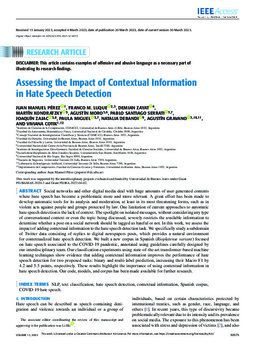Mostrar el registro sencillo del ítem
Assessing the Impact of Contextual Information in Hate Speech Detection
| dc.rights.license | https://creativecommons.org/licenses/by/4.0/ | es_AR |
| dc.contributor.author | Gravano, Agustín | es_AR |
| dc.contributor.author | Pérez, Juan Manuel | es_AR |
| dc.contributor.author | Luque, Franco M | es_AR |
| dc.contributor.author | Zeyat, Demián | es_AR |
| dc.contributor.author | Kondratzky, Martín | es_AR |
| dc.contributor.author | Moro, Agustín | es_AR |
| dc.contributor.author | Serrati, Pablo Santiago | es_AR |
| dc.contributor.author | Zajac, Joaquín | es_AR |
| dc.contributor.author | Miguel, Paula | es_AR |
| dc.contributor.author | Debandi, Natalia | es_AR |
| dc.contributor.author | Cotik, Viviana | es_AR |
| dc.date.accessioned | 2023-05-31T18:56:49Z | |
| dc.date.available | 2023-05-31T18:56:49Z | |
| dc.date.issued | 2023 | |
| dc.identifier.uri | https://repositorio.utdt.edu/handle/20.500.13098/11849 | |
| dc.identifier.uri | https://doi.org/10.1109/ACCESS.2023.3258973 | |
| dc.description.abstract | Social networks and other digital media deal with huge amounts of user-generated contents where hate speech has become a problematic more and more relevant. A great effort has been made to develop automatic tools for its analysis and moderation, at least in its most threatening forms, such as in violent acts against people and groups protected by law. One limitation of current approaches to automatic hate speech detection is the lack of context. The spotlight on isolated messages, without considering any type of conversational context or even the topic being discussed, severely restricts the available information to determine whether a post on a social network should be tagged as hateful or not. In this work, we assess the impact of adding contextual information to the hate speech detection task.We specifically study a subdomain of Twitter data consisting of replies to digital newspapers posts, which provides a natural environment for contextualized hate speech detection. We built a new corpus in Spanish (Rioplatense variant) focused on hate speech associated to the COVID-19 pandemic, annotated using guidelines carefully designed by our interdisciplinary team. Our classification experiments using state-of-the-art transformer-based machine learning techniques show evidence that adding contextual information improves the performance of hate speech detection for two proposed tasks: binary and multi-label prediction, increasing their Macro F1 by 4.2 and 5.5 points, respectively. These results highlight the importance of using contextual information in hate speech detection. Our code, models, and corpus has been made available for further research. | es_AR |
| dc.description.sponsorship | Este artículo se encuentra publicado en IEEE Access, 11, 30575-30590. | es_AR |
| dc.format.extent | pp. 30575-30590 | es_AR |
| dc.format.medium | application/pdf | es_AR |
| dc.language | eng | es_AR |
| dc.relation.ispartof | IEEE Access, vol. 11, pp. 30575-30590, 2023, doi: 10.1109/ACCESS.2023.3258973. | |
| dc.rights | info:eu-repo/semantics/openAccess | es_AR |
| dc.subject | NLP | es_AR |
| dc.subject | Text classification | es_AR |
| dc.subject | Hate speech detection | es_AR |
| dc.subject | Contextual information | es_AR |
| dc.subject | Spanish corpus | es_AR |
| dc.subject | Covid-19 hate speeches | es_AR |
| dc.title | Assessing the Impact of Contextual Information in Hate Speech Detection | es_AR |
| dc.type | info:eu-repo/semantics/article | es_AR |
| dc.type.version | info:eu-repo/semantics/publishedVersion | es_AR |
Ficheros en el ítem
Este ítem aparece en la(s) siguiente(s) colección(ones)
-
Artículos presentados, aceptados y publicados
Publicaciones de investigadores ditellianos en revistas científicas

